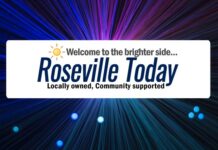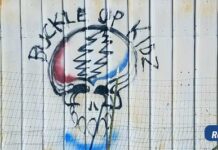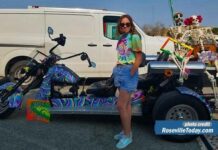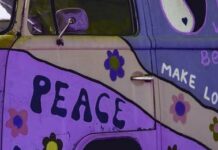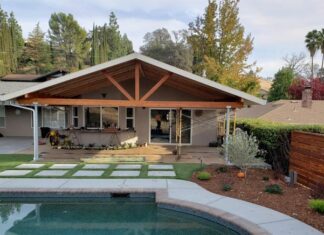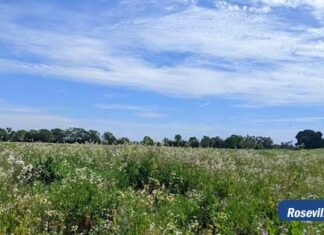SACRAMENTO, Calif.- When high school student Sean Federwitz began his senior year at Del Oro High School in Loomis, Calif., last fall he knew one thing for sure: He had to successfully complete a “senior project” for his government studies class if he wanted to graduate.
The first idea he had – involving a nearby school for the mentally disabled was discarded because it was too much like the project he had done to become an Eagle Scout. He then realized he wanted his project to somehow benefit his stepfather, 36-year-old Chris Hendrickson, who was diagnosed with esophageal cancer in May and underwent surgery at UC Davis Medical Center in June.
The question was what to do, exactly. An accomplished auto mechanic, Federwitz thought about rebuilding a car, raffling it off and then donating the proceeds to cancer research. He was on the right track, but a better way to raise money, suggested by a teacher, soon presented itself: hold a benefit spaghetti dinner.
“In my mind, it seemed impossible,” recalled Federwitz, who besides having little food serving experience is partially deaf and can carry on conversations only with the help of a hearing aid. “I asked the teacher, ‘Could I really pull that off?’ And she said, ‘yes.'”
She was right. It took two months of effort, but the dinner was held on Nov. 14. It attracted over 60 paying guests and the fruit of the event, a check made out to the UC Regents for $2,530, was presented by Federwitz during a brief ceremony at the UC Davis Cancer Center last Wednesday to the man who operated on his stepfather, James Goodnight, Jr, professor and chair of the Department of Surgery.
“Sean is a very thoughtful, sincere young man,” said Goodnight. His effort to support of the cancer center is a amazing gesture for someone of his age, or of any age for that matter. We deeply appreciate his thoughtfulness and the generosity of those who participated.”
A former director of the UC Davis Cancer Center, Goodnight has broad surgical oncology experience. He specializes in malignant melanoma, breast cancer and limb-sparing surgery for bone and soft tissue cancers. He was principal investigator for the National Surgical Adjuvant Breast and Bowel Project and Breast Cancer Early Detection Program. He has published research on esophageal, colorectal, pancreatic, and liver cancer.
In a procedure known as a transhiatal esophagectomy, Goodnight removed Hendrickson’s esophagus during a 10-hour surgery. Hendrickson then underwent a course of chemotherapy and radiation treatments that ended in January. He is now cancer free and recently returned to work.
Sean, for his part, had never heard of esophageal cancer until his stepfather came down with the disease. And even then he didn’t know much about it. “I just knew what my dad had told me, what the statistics were and stuff like that,” Federwitz said.
As for his senior project, Federwitz’s challenge was not to do a term paper on his stepfather’s disease. It was to somehow put on a successful benefit dinner.
The first thing he did and it turned out to be a smart move was to make use of his family’s connections. Knowing that his grandfather, a former chief of the Newcastle Volunteer Fire Department, had been a Lion’s Club member, Federwitz showed up at a regularly scheduled meeting of the group, told them about his dad and basically asked for help.
Specifically, Federwitz, who said that he was “very nervous,” asked whether anyone would be willing to be his mentor a requirement for his senior project. Randy Ubry, one of the club’s members, didn’t directly answer. Instead, he pointed out that before anything could happen, Sean had to find a site for the dinner.
That very night Federwitz called the owner of the Portuguese Hall where the Lion’s Club held its meetings and asked if he could have the dinner there. The owner agreed to donate the hall free of charge. Federwitz then called Ubry to tell him, and Ubry, in turn, told Federwitz a couple of things: One, that he would like to be his mentor; and two, that he was the owner of a local catering business and so could put on the dinner himself.
The two agreed to divide up the work. Ubry would handle the food, which involved among other things working his connections in the restaurant industry to obtain donated items, such as French bread and spaghetti sauce and Federwitz would get the word out about the event and figure out how to maximize the proceeds.
The first thing he did was to print up 500 flyers, which in addition to advertising the dinner, made clear that the festivities would include something Federwitz thought of all by himself a raffle of donated items. He then handed out the flyers to his teachers and posted them anywhere he could think of, such as on community bulletin boards.
Most importantly, he distributed the flyers to local businesses. They posted the flyers in their windows and about 15 ended up donating to the raffle including items such as gift certificates, planter boxes, a snowboarding jacket and a bicycle jersey. His mother, Mary Hendrickson, put the flyer up on her blog, which led a Texas resident to donate $100 and four esophageal cancer survivors who lived outside the area to come to the dinner.
Questions about attendance caused Federwitz the most anxiety, as he was only able to sell 10 tickets in advance. He needn’t have worried. Nearly 65 people bought tickets. At the dinner, Federwitz described his project and introduced his stepfather, who talked about his cancer.
A third speaker, one of the Lion’s Club members, commented on how shy Federwitz had been at that first meeting and what a contrast that was to the poise he had just displayed before the crowd.
The whole effort also impressed someone else, his stepfather.
“I’m very proud that Sean thought about me and the cause of cancer and esophageal cancer,” Hendrickson said.
As for the project, there’s one more hurdle a presentation at the end of the school year before a panel of six teachers and community members. But that’s a few months off. Right now Federwitz is still savoring the benefit dinner.
“It was a lot of work, but I’m glad I did it,” he said.
UC Davis Cancer Center is a National Cancer Institute-designated cancer center that cares for 9,000 adults and children with cancer each year from throughout the Central Valley and inland Northern California.
(21+ years strong)
Welcome to the brighter side!
Get in front of local customers! 24/7 (365)




